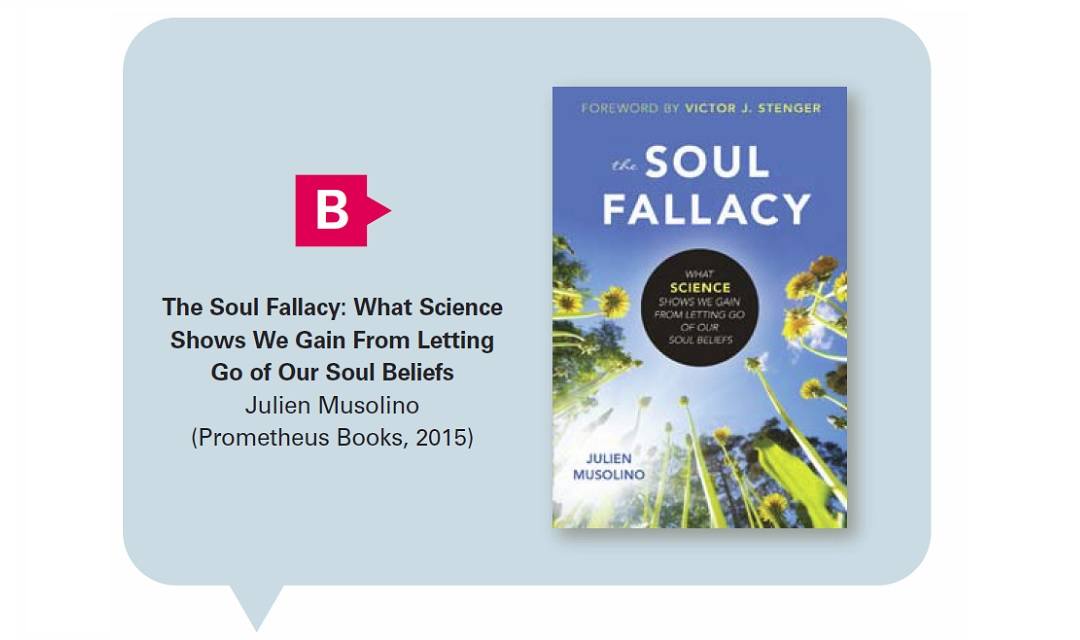This article first appeared in the Christian Research Journal, volume 38, number 5 (2015). For further information or to subscribe to the Christian Research Journal please click here.
a book review of
The Soul Fallacy:
What Science Shows We Gain From
Letting Go of Our Soul Beliefs
by Julien Musolino
(Prometheus, 2015)
Julien Musolino, a cognitive scientist at Rutgers University, recognizes that humans both past and present naturally believe in an immaterial soul. Yet he reports that “the current scientific consensus rejects any notion of soul or spirit as separate from the activity of the brain” (p. 21). Rather, most scientists embrace a materialistic conception of human beings, famously expressed by Francis Crick (of DNA fame) as “the Astonishing Hypothesis…that ‘You,’ your joys and your sorrows, your memories and your ambitions, your sense of personal identity and free will, are in fact no more than the behavior of a vast assembly of nerve cells and their associated molecules.”1 Musolino sets out to show that the Astonishing Hypothesis is true by arguing that we have no good scientific reason to believe in souls and that nothing important is lost by abandoning the idea.
The Science of the Soul. For many people, the soul is primarily a matter of metaphysics, not science. As an immaterial entity, the soul is postulated because it makes sense of certain foundational assumptions we make about ourselves. We think of ourselves as single subjects, unified at a time and enduring over time; we think our conduct can be guided by contemplating abstract principles of logic and morality; and we think it is often within our power to make free choices.
However, Musolino denies that the soul can be cordoned off as a purely metaphysical postulate. He argues that “the soul is a scientific hypothesis…and dualism makes claims about the detachability of mind and body and the existence of a substance capable of causal interaction with ordinary matter [that]…are fair game for scientific investigation” (24, emphasis in original). He takes aim, in particular, at those he calls the “New Dualists,” authors such as Dinesh D’ Souza and Stewart Goetz, who claim that there is scientific evidence for the soul. But there are problems with Musolino’s methodology and in his account of dualist commitments.
Methodology Matters. At numerous points in his book, Musolino appeals to “the scientific consensus” (79) and claims that even when dualists have scientific credentials, “their conclusions are every bit as outrageous as those of…flat-earthers” (81). This, however, is an example of the consensus gentium (agreement of the people) fallacy that replaces the objective basis of science (data) with the subjective agreement of most scientists (sociology). History shows this is unreliable. The consensus of ancient astronomy was that planetary orbits must be composed of circular motions: Kepler’s analysis of Tycho Brahe’s data for Mars showed this was wrong. The consensus of classical physicists was that light travels in straight lines, but during a total eclipse in 1919, Sir Arthur Eddington confirmed Einstein’s prediction that the light of distant stars would bend around the sun. It is not unusual for most scientists to be wrong, often because they are in the grip of a false, nonscientific assumption.
Musolino thinks the soul is a natural but prescientific assumption that has to go. Like everyone though, Musolino has nonscientific assumptions of his own. As a materialist, he expects the soul to go the way of “the luminiferous ether” (59), and a main reason is “there is no way to even conceive of a possible mechanism for causal interaction between body and soul” (136). But he does not see the significance of the fact that the ether (a hypothetical invisible substance pervading the universe) was abandoned because electromagnetic radiation does not require a medium of propagation as a mechanism. Science does not always progress by reducing one thing to another: it can also show that a phenomenon is irreducible and needs to be accepted on its own terms.
Further, if Musolino means we should only accept an explanation that provides a physical mechanism, this begs the question against the dualist, who denies any such mechanism exists. He does not consider the more promising idea of an intermediary that is neither inherently physical nor inherently mental but can exist in both forms. In my view, information is the most plausible candidate, since it can exist both as the abstract mental content of a belief or volition and as the concrete physical encoding of data and instructions in books, computers, and the brain.
Musolino also repeats the standard charge that if the soul did anything, it would violate the conservation of energy law (136–40). But this principle was developed by observing exclusively physical systems and does not obviously apply to soul–body interaction. And Robin Collins notes that even in physics, energy conservation cannot be defined “for the gravitational field in general relativity,” yet “gravitational fields…clearly have real physical effects on matter.”2 But even if energy conservation does apply to mind–body interaction, it holds for only closed systems, and if dualism is true, the body may be an open system—open to the soul’s intervention—just as, for theists, the physical universe is open to God’s intervention.3
Musolino maintains that “all scientists, by definition, are methodological naturalists” and asserts that since this principle “makes no metaphysical claim about the nature of reality, [it] is therefore open to the possibility of supernatural phenomena” (60). This is rather misleading. In standard formulations, methodological naturalism asserts that scientists may infer only natural causes. This allows that supernatural causes may exist, but it denies one can have scientific evidence for them. So if the soul is defined as “supernatural,” this trivializes Musolino’s claim that “scientists have discovered that there is no credible evidence for the existence of the soul” (61). And this conflicts with Musolino’s claim that the “dualistic hypothesis” is a scientific one. Still more confusingly, he asserts, “As soon as something….becomes understood and incorporated into the formulation of science, it becomes, ipso facto, physical or material. After all, what does physical mean other than whatever physics, or science more generally, needs to postulate to understand the physical world[?]” (143, emphasis in original).
But if that is correct, then if God is required to “understand the physical world” (e.g., to explain its existence and fine-tuning), then God is “physical or material”! Apparently, dualists cannot win, for if we do need to postulate souls to understand the physical world, souls are material entities.
Musolino is also both unfair and inconsistent in charging that dualists “do not tell us what [the soul] is, they tell us [only] what it is not” (64). He is unfair because historically, the soul has never been defined purely negatively—as an immaterial substance. It has been defined by a number of higher faculties, such as consciousness, reason, volition, and moral judgment. Yet Musolino is also inconsistent, because he later tries to show that these faculties are all generated by the brain.
Changing the Subject. Musolino dismisses introspective knowledge of the mind as “the first-person fallacy” (88) because “our unified sense of self, our sense of conscious will, and our subjective feelings of pain—phenomena so dear to dualists—can all be affected by brain damage” (161). For example: in split brain cases, one cerebral hemisphere can process signals unconsciously while the other does so consciously (155–57); and damage to the frontal and parietal lobes may cause pain asymbolia, making it impossible to feel pain (159–60). But while this provides more evidence of causal connections between neurological and psychological events, it is no reason to conclude that the mental is identical to the physical. Citing physical causes does not explain the intrinsic character of consciousness. Indeed, Musolino admits that although split-brain patients have a divided unconscious mind, their consciousness is not divided (157). And the fact that a pain experience requires us to receive signals from the brain does not explain why there is something it is like to feel pain. Musolino claims that “the soul gives rise to qualia” is a nonexplanation (161), but if the soul is a mental subject, this does help to explain why each person has a unique sense of what it is like to be in pain.
Still people can lose the ability to feel pain or the sense of conscious authorship of an action, as in Alien Hand Syndrome (158–59). So Musolino asks, “Souls need functioning brains, so how could they function without brains?” (174). However, the dualist can respond that Musolino’s examples show only that the soul needs a brain in order to connect with the body and the external world, and that the dependency is in both directions, since the body also needs the soul in order to explain life and consciousness. Postulating an independent soul that interacts with the body is therefore a more comprehensive explanation of the facts than physicalism and is certainly not excluded on purely scientific grounds.
What Is Left? Musolino is aware that most people resist the idea of reducing a person to the brain because it seems to exclude personal identity and free will. But he claims “there remains a physical ‘you’” (216) who is the author of your actions and that free will and determinism can coexist if actions have rational causes (214–15). However, dualist philosopher Dean Zimmerman argues that when we consider any plausible referent for the “I” in the physical brain, they all “appear surprisingly like clouds on close inspection: it is not clear where they begin and end, in space or time. Many particles are…neither clearly ‘in,’ nor clearly ‘out.’”4 So there is no real basis for personal identity.5 And on Musolino’s view, brain events are determined by causes outside of our control, so we are not ultimately responsible for our actions, which he later admits (230–35).
Musolino argues that nothing worth wanting is lost without the soul; in fact, we are better off. Following the Stoics, he claims death is not to be feared since, if materialism is true, we will not be conscious and cannot suffer. And he also maintains that critics are wrong to claim materialism makes life meaningless. But even if materialism gives life a relative meaning—a meaning relative to our temporal goals—if our life is terminated by oblivion and if there is no God to ground an objective purpose for existence, there is no ultimate meaning to our life. Yet this would not be true if God gave us immortal souls with an eternal destiny. —Angus Menuge
Angus Menuge, PhD, is professor of philosophy at Concordia University, Wisconsin.
The responses below first appeared in the Christian Research Journal, volume 38, number 06 (2015).
The Soul Fallacy
One of the main goals of the Christian Research Journal, which recently published a critical review of my book The Soul Fallacy (vol. 38, no. 5), is to “provide a strong defense of Christian beliefs.” While I commend Concordia University philosopher Angus Menuge for trying to defend the indefensible, his review of my book strikes me as a carefully orchestrated act of nitpicking, sprinkled with a copious amount of non-sequiturs and misunderstandings. I found nothing of substance in Angus’s comments and certainly no defense of the soul.
Given what we know about the world, the idea that people have immortal souls is no more plausible than the claim that a well-trained athlete can run a marathon under ten minutes. First, the domain of the soul has shrunk as scientific understanding progressed. Second, there is no formalism that describes the soul substance. Third, there is no objective evidence that souls exist. Fourth, souls fly in the face of what we know about modern science (for an explanation of this important point and a correction to Menuge’s physical musings, see physicist Sean Carroll’s piece in Scientific American on physics and the immortality of the soul). Fifth, there is overwhelming evidence for a materialistic account of mind. The soul then has exactly the set of properties that it should have if it didn’t exist.
The good news, as I take great pains to show throughout The Soul Fallacy, is that we have nothing to lose, morally, spiritually, or aesthetically, by letting go of our belief in the soul. In fact, we even have something important to gain. This, I hope, is a conclusion that we can all embrace—Christians and non-Christians alike.
Julien Musolino, PhD
Rutgers University, New Brunswick
Canada
Angus Menuge replies: By accepting only the impersonal results of scientific investigation, Musolino has excluded the most promising arguments for the soul. Without a soul, the scientific rationality that Musolino prizes is impossible, since there is no entity capable of unifying several reasons at a time or of persisting over the time it takes to draw a conclusion. The soul, unlike the physical brain, is capable of interacting with the abstract universals of logic, mathematics, and morality, all of which are presupposed by scientific progress. The illusion that the soul is incapable of interacting with the brain is created by the question-begging assumptions that the physical world is a closed system or that the soul must be reinterpreted as a physical variable (as Sean Carroll apparently assumes). Meanwhile, scientifically informed books defending the soul and its persistence after death are increasing, not decreasing.
NOTES
- Francis Crick, The Astonishing Hypothesis: The Scientific Search for the Soul (New York: Scribner, 1994), 3.
- See Robin Collins, “The Energy of the Soul,” in The Soul Hypothesis: Investigations into the Existence of the Soul, ed. Mark C. Baker and Stewart Goetz (New York: Continuum, 2011), 127.
- Alvin Plantinga, Where the Conflict Really Lies: Science, Religion and Naturalism (New York: Oxford, 2011), 78.
- Dean Zimmerman, “From Experience to Experiencer,” in The Soul Hypothesis, 168–96, 187.
- It is therefore not surprising that some, such as Sam Harris, see materialistic neuroscience as congenial to the Buddhist denial of the existence of the self. For a response, see Elliot Miller’s “The New Atheism Meets the New Spirituality: Buddhism through the Filter of Sam Harris,” Christian Research Journal 38, 3 (2015): 36–41.









